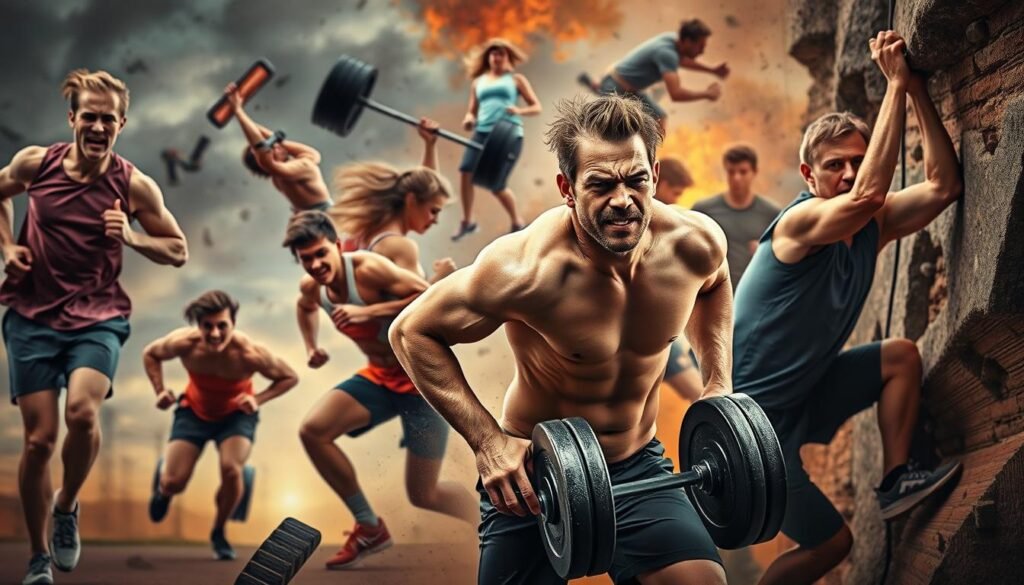In endurance competitions, about 30% of the athletes face dehydration problems. This shows the critical side of athletic performance that many ignore. Overexertion happens when you exercise too much without enough rest. It’s very important for staying healthy and avoiding injuries. The link between not eating well and overexertion is huge. Bad nutrition makes the dangers of overexertion worse and affects your overall health. This article will talk about how staying hydrated and eating right can stop injuries from overexertion. We’ll also point out how to spot its signs and symptoms. Knowing about these health issues helps you exercise smarter and safer.
Key Takeaways
- Dehydration impacts up to 30% of people in endurance sports, showing how key it is to drink enough fluids.
- Eating the right foods is vital to avoid the negative effects of overdoing your workouts.
- Knowing when you’re pushing too hard can prevent getting hurt.
- If you don’t stay hydrated, your body can’t cool down properly. This ups the chance of getting a heat stroke.
- Always overdoing it can harm your health now and later on.
Understanding Overexertion
Overexertion means pushing yourself too hard, both in mind and body. This strain can lead to health problems and decrease performance. The chance of getting hurt varies by age, health history, and where you are. The term overexertion definition covers both the physical and mental strain from hard activities.
Many who do intense workouts often overdo it, especially if they don’t rest enough between sessions. Gyms see injuries from overexertion, using equipment wrong, and not following the rules. In Texas, these issues often cause muscle strain or even broken bones.
Getting hurt from overexertion can mean anything from small cuts to serious joint or back pain. Knowing your limits during exercise helps manage both body and mind. Doing exercises right and stretching can prevent too much strain.
Studies show that quickly increasing exercise intensity without the right preparation can lead to injuries. It causes an imbalance in workout loads, increasing injury risk. To avoid this, include rest days in your exercise plan. For more on preventing overexertion, check the detailed guide here.
| Type of Injury | Common Causes | Likelihood in Fitness Centers |
|---|---|---|
| Strains and Sprains | Improper technique, excessive force | High |
| Fractures | Forceful movements | Medium |
| Dislocations | Overextending joints | Medium |
| Cuts and Lacerations | Contact with equipment | High |
| Back Pain | Poor posture, incorrect exercises | High |
| Tendonitis | Repetitive movements | Medium |
What Causes Overexertion?
Knowing what leads to overexertion is key to staying healthy. It can come from doing the same thing over and over, not sitting or standing right, and being in very hot or cold places. Knowing why overexertion happens lets people avoid injuries.
Repetitive Movements and Its Impact
Doing something again and again puts a lot of stress on our muscles and joints. This includes typing, heavy lifting, or any other repeat actions. It can make you really tired and hurt. This is a big reason why people overwork themselves.
These actions might cause problems like tendinitis or carpal tunnel syndrome. If we understand the dangers of repeating movements, we can find ways to lessen the stress. For tips on avoiding overexertion, check out this resource.
Improper Technique and Posture
Improper posture is another big cause of overexertion. Picking up heavy stuff or doing activities wrong can hurt muscles. People often forget how crucial it is to keep the right form during exercises and daily tasks. Ignoring this makes overexertion more likely and hurts how well our bodies perform.
Extreme Temperatures as a Risk Factor
Working out or being in extreme temperatures also increases overexertion risk. Too much heat can dehydrate you and cause heat illnesses. Cold places can slow blood flow and make muscles work less effectively. It’s important to match your activities to the weather to stay safe. Being aware of and reacting to the weather can help avoid overexertion.
Signs and Symptoms of Overexertion
It’s crucial to know when you’re pushing too hard. Your body and mind tell you when to take a break. Catching these signs early prevents bigger problems.
Pain and Discomfort
Pain is a clear symptom of overexertion. It might feel sharp or just a dull ache. Whether it hits a specific spot or is all over, it’s your body’s way of saying, “Slow down.” Listening to this can stop more severe injuries.
Fatigue: Physical and Mental
Fatigue is a big red flag. It shows in your body and your thoughts, making everything harder. When your muscles feel weak or sore for too long, that’s physical fatigue. If you’re moody, snappy, or can’t focus, your mind is also tired. Both are signs you need to rest and recharge.
Increased Risk of Injury
Overdoing it raises your injury risk. If you’re tired, you could get hurt more easily. That can set back your fitness progress. Paying attention to symptoms of overexertion keeps you safer. This helps you stay on track with your fitness goals.
| Symptoms | Description | Management |
|---|---|---|
| Pain | Localized or widespread discomfort indicating the need to stop or reduce activity. | Take a break, apply ice, and seek medical advice if persistent. |
| Fatigue | Physical weakness and mental sluggishness affecting daily tasks. | Rest, hydrate, and consider altering workout intensity. |
| Injury Risk | Increased likelihood of strains, sprains, or other injuries during activities. | Implement a balanced training schedule and incorporate rest days. |
Overexertion in Various Activities
Overexertion during activities is a big issue in many areas. This includes sports and manual labor. Athletes often go beyond their limits in training and competitions. They do not rest enough. This can cause sports injuries like strains and sprains. The most serious condition is rhabdomyolysis. This harms muscles and kidneys.
In jobs, especially in service and trade, workers get hurt by doing the same thing over and over or lifting too much. This can be more than their bodies can handle. Pushing too hard leads to tiredness and injuries. These injuries can cause a big drop in how much they can do. Something like not drinking enough water when it’s hot can make overexertion risks worse. It makes the body work harder and can cause serious illnesses from the heat.

It’s very important to know the signs of overexerting yourself in sports and work. Studies show that recovery time and what you eat make a big difference. Proper drinking of water prevents major health issues. Athletes need enough carbs and protein for better performance and less tiredness. People at work need to drink enough and keep their electrolytes balanced. This helps avoid the problems from working too hard for too long.
| Activity Type | Risk Factors | Potential Injuries |
|---|---|---|
| Competitive Sports | Insufficient recovery, dehydration | Strains, sprains, rhabdomyolysis |
| Manual Labor | Repetitive tasks, heavy lifting | Muscle fatigue, orthopedic injuries |
| Athletic Training | Overtraining syndrome | Decreased performance, chronic fatigue |
Knowing how overexertion happens in different activities is key. It helps us find ways to keep healthy and perform well. We also want to lower the injury risks. For more information on this topic, look into this study. It talks about the best ways to manage and use the right nutrition strategies.
Overexertion, Dehydration, Poor Nutrition, and Other Factors
The link between overworking your body and what you eat is key to staying healthy. Eating right gives your body the energy it needs for activity. Not eating well can lead to pushing yourself too hard. Also, not drinking enough water affects how well you perform and recover. Knowing how these factors interact helps us focus on eating and drinking right. These are both vital for doing well and avoiding injuries.
Connecting Nutrition with Physical Health
For those who are active, eating a balanced diet is crucial. Foods with carbohydrates, proteins, fats, vitamins, and minerals help with energy, fixing muscles, and overall health. Not getting enough nutrients can make your body less effective. It can make you more tired and likely to overdo it. Eating foods rich in nutrients, like oatmeal and whole grain pasta, is also good for staying hydrated.
The Role of Hydration in Preventing Overexertion
Staying hydrated is key to doing well when you’re active. Losing just 2% of your body’s water can make you feel thirsty, tired, and dizzy. Not drinking enough water makes your heart work harder. It also lowers the amount of blood your body can use and makes it hard to stay cool. People who are very active should pay extra attention to drinking enough water. This is especially true when it’s hot and they’re sweating a lot. Experts say men should drink about 3.7 liters of fluids a day, and women should drink about 2.7 liters.
Nutritional Deficiencies and Their Effects
Eating poorly can affect your health in many ways. Drinking lots of soda, energy drinks, and eating salty foods can make hydration worse. This is because they take water out of your body. Also, some medicines, like antihistamines, can make you dehydrated. You might need to drink more water. Older people might not keep water in their body well and might not know they need to drink more. Being very dehydrated is serious. It can cause a fast heart rate and sunken eyes. So, it’s important to fix poor eating habits to stop dehydration and overexertion.
| Effect | Response to Dehydration | Recommended Actions |
|---|---|---|
| Mild Symptoms | Fatigue, dry mouth, dizziness | Increase fluid intake and monitor hydration levels |
| Severe Symptoms | Rapid heart rate, low blood pressure, sunken eyes | Seek medical attention and rehydrate urgently |
| Nutritional Sources | Whole grains, fruits, vegetables | Incorporate nutrient-rich foods into daily meals |
How to Prevent Overexertion
To keep your health and productivity up, avoiding overexertion is key. Start with proper warm-ups, listen to your body, and mix rest with activity. This balance can greatly cut down on overexertion injuries.
Proper Warm-Up Techniques
Warm-up exercises get your body ready and boost blood flow to your muscles. This makes you more flexible. It also conditions your muscles and joints, making injuries less likely during tough activities. Dynamic stretches and light aerobic exercises are best for this.
Listening to Your Body’s Signals
It’s important to hear what your body tells you. This helps spot early signs of being tired or hurt. If you keep going despite feeling pain or worn out, injuries could get worse. It’s better to pause and rest. Being careful can speed up recovery and keeps you healthy.
Balancing Activity with Rest
Rest is a must in any exercise plan. It lets your body heal after being active, avoiding too much tiredness and injuries. Enough sleep and taking days off are key. They help your muscles rebuild and stop overexertion in future activities.

Nutrition Strategies for Better Health
To get better health and boost your physical abilities, good nutrition plans are key. Eating a variety of foods rich in nutrients gives our body the vitamins and minerals it needs. This mix helps with healing and keeping energy levels steady.
Vital parts of a healthy diet include vegetables, fruits, whole grains, and lean meats. They play a big role in keeping us well.
Incorporating Nutrient-Rich Foods
For those who are active, eating foods full of different nutrients is crucial. Some great choices are:
- Leafy greens: Spinach and kale are loaded with important vitamins and minerals.
- Fruits: Bananas and berries offer quick energy and fight off damage with antioxidants.
- Whole grains: Brown rice and quinoa give you long-lasting energy.
- Lean proteins: Chicken, turkey, and beans help fix and build muscles.
The Importance of Electrolyte Balance
Keeping your electrolytes in check is needed, especially when you’re active. Electrolytes help our muscles and organs work best. Without enough, our body can lose up to 2 quarts of fluid every hour during tough sports.
Drinking fluids with electrolytes is key to getting back what’s lost. Sports drinks come in different types, each serving different needs. They can be isotonic, hypotonic, or hypertonic.
For recovery, adults might drink something with 200 milligrams of salt in a 16-ounce sports drink. It’s also smart to drink up two hours before starting your activity. This preps your body for what’s ahead, boosting how well you perform.
The Consequences of Poor Nutrition
Poor nutrition can deeply affect your health and wellness. If you are active, these effects stand out even more. Not eating right can hurt how well you perform and recover. Knowing this can push people to eat better.
Impact on Recovery and Performance
Nutrition plays a big role in recovery. Active people need the right nutrients to fix muscles and get energy back. If you don’t eat well, you might take longer to recover and not do as well in activities. Bad nutrition can make you tired, which can lower your ability to do things well.
How Nutritional Deficiencies Lead to Injury
Not getting enough vitamins and minerals can make you get hurt more easily. For example, without enough protein, your muscles don’t fix themselves as fast. This could lead to more injuries from doing too much. It’s very important to eat well to avoid getting hurt, especially if you are very active.
| Nutritional Deficiency | Consequences | Impact on Recovery | Injury Risk |
|---|---|---|---|
| Protein Deficiency | Reduced muscle repair | Extended recovery time | High risk of strains |
| Iron Deficiency | Fatigue and weakness | Slower recovery process | Increased injury risks |
| Calcium Deficiency | Bone health issues | Delayed recovery | Increased fracture risks |
| Vitamin D Deficiency | Weakened immune system | Higher susceptibility to illness | Greater injury risk from illness |

Addressing Dehydration as a Health Concern
Dehydration can seriously affect your health and how well you do daily activities. It’s especially important for those who are active to know the risks. Feeling tired, getting headaches, and doing worse in activities are clues that you need to drink more water.
If you don’t drink enough water regularly, you could face bigger health issues, like kidney problems. It’s key to drink water often. Foods with lots of water, like fruits and yogurt, also help keep you hydrated. About 22% of our water comes from what we eat in the U.S.
Staying well-hydrated helps you perform better in sports and life. Keep a water bottle with you to remind you to drink. Eating foods full of water and trying flavored waters can make staying hydrated fun.
Kids, older people, and athletes are more likely to get dehydrated. They need to watch for signs, like the color of their pee. Pee that’s light yellow or pale amber means you’re probably drinking enough. Dark pee means you need more water.
Knowing about dehydration and its dangers is key to avoiding it. Taking steps to check how much you need to drink and looking out for dehydration signs helps a lot. By focusing on drinking enough each day, you support your health and do better in all your activities.
Conclusion
Understanding the overexertion and nutrition relationship is key for top health. By knowing overexertion signs, people can protect their health. Good hydration and eating right also boost how well you perform and lower injury risks.
One study showed how female soccer players link hydration, sleep, and fewer injuries. This shows a common trend in sports and everyday life.
Listening to your body helps manage how much you move and what you eat. Getting enough sleep and the right nutrients improves recovery and how well you do. Not drinking enough hurts your exercise and recovery, and that’s important for long-term health.
So, balancing eating, drinking, and exercising is crucial not just for athletes but everyone. Knowing your limits and making smart food choices helps avoid injuries and sickness. It leads to a long, healthy life.